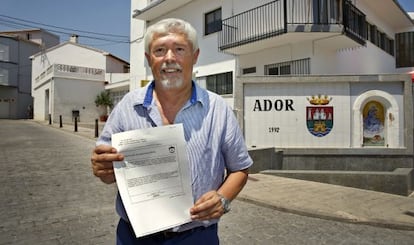Spanish town where the siesta is sacred catches world’s imagination
Ador, a small community in Valencia, has issued an edict to protect the afternoon nap


Ador is a community of some 1,400 souls located 10 kilometers inland from the coastal resort of Gandia, in Valencia. Like most others in the area, it is dependent on orange growing for its income. While not exactly sleepy, the town council has decided that residents deserve to be able to take their afternoon siesta in peace.
Mayor Joan Faus, an independent who heads a coalition of left-leaning parties, has issued an edict to “guarantee everybody’s rest and thus better deal with the rigors of the summer.” This means that between 2pm and 5pm during the summer months, when temperatures regularly pass 35°C, residents and visitors should do their best to make no noise. “It’s not an imposition, it’s a recommendation,” says Faus, adding that he is surprised that the move has made headlines around the world.
If you get up in the early hours, you need a siesta to rest and restore your energy. That’s why we issued the ruling”
The ruling is not new, particularly in a community with deep agricultural roots. “Ador is an orange-growing area, and at certain times of the year there is a lot of work to be done. People get up before dawn to work in the fields, and at midday return home to escape the heat,” says Faus, a 67-year-old former teacher. “So if you get up in the early hours, you need a siesta to rest and restore your energy. That’s why we issued the ruling. This means that bars, shops, and even the municipal swimming pool closes for a couple of hours. The streets are deserted and the silence is deafening.
But not everybody supports the move, particularly outside Spain, says Faus, who admits he tries to lead by example. “The English are astonished. They think this means that we don’t want to work. But that’s not the case at all,” he explains, outlining the benefits of the siesta. The UN’s World Health Organization even recommends a half-hour nap in the middle of the day; it also protects children and the elderly from the heat.
Since news got out about the edict, Faus has been inundated with calls from journalists around the world.
The English are astonished. They think this means that we don’t want to work. But that’s not the case at all”
Dutch television reporter Jessica van Spengen was in Ador earlier this week to quiz Faus. “What makes this so interesting is that the mayor is virtually obliging people to take a siesta. This is very strange for Dutch people. There are different views on this, but when you live in Spain, like me, you understand the reason for this, and that is the high temperatures,” she says.
Older residents have given their backing to the siesta ruling, even though many no longer take a nap in the afternoon. But they still respect the right of others to sleep. Faus says that anybody who does disturb the peace will not face any kind of sanction: “We’re not trying to coerce people,” he explains.
Pep, aged 40, says it takes him back to his childhood. He’s enjoying a pre-lunch drink with friends in a bar on the main square. “I was just telling everybody that when my sister and I were children, we would try to peek out of the front door when everybody was sleeping. It was the only way we could pass the time,” he says.
“Being the first town in Spain where the siesta is sacred is a good thing,” says Vicent, sitting next to Pep. He pays for the round of drinks and heads off home for lunch – and of course the obligatory siesta afterwards.
Tu suscripción se está usando en otro dispositivo
¿Quieres añadir otro usuario a tu suscripción?
Si continúas leyendo en este dispositivo, no se podrá leer en el otro.
FlechaTu suscripción se está usando en otro dispositivo y solo puedes acceder a EL PAÍS desde un dispositivo a la vez.
Si quieres compartir tu cuenta, cambia tu suscripción a la modalidad Premium, así podrás añadir otro usuario. Cada uno accederá con su propia cuenta de email, lo que os permitirá personalizar vuestra experiencia en EL PAÍS.
¿Tienes una suscripción de empresa? Accede aquí para contratar más cuentas.
En el caso de no saber quién está usando tu cuenta, te recomendamos cambiar tu contraseña aquí.
Si decides continuar compartiendo tu cuenta, este mensaje se mostrará en tu dispositivo y en el de la otra persona que está usando tu cuenta de forma indefinida, afectando a tu experiencia de lectura. Puedes consultar aquí los términos y condiciones de la suscripción digital.








































